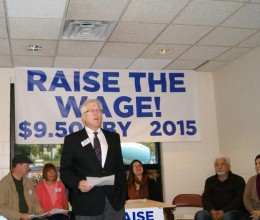Corporate Profits Up, Wages Down, and a Call From 600 Economists to Raise the Minimum Wage

For the fourth year in a row, real median weekly earnings for full-time workers have fallen. Corporate profits, on the other hand, have been on the rise. At Economix, Jared Bernstein unpacks the data and concludes that one of the few ways we can fix wage stagnation is through the power of collective bargaining:
In some of these models — the ones that make sense to me — the tautness of the job market is a key factor as employers and potential workers hash out an agreement on wages (or not — some negotiations fail). The employer would like to offer just enough to make the hire, and if there’s a line outside her door, that amount goes down. For the worker, it’s the opposite. As Professors Hall and Krueger note, “the job seekers’ bargaining position … is much stronger if the next job prospect is easy to find.”
The economist Lawrence Katz, an important thinker is this debate because of his deep contributions to the literature on education as a wage determinant, agrees: “The only moments we’ve had of broadly shared prosperity have been in tight labor markets.”
Absent more individual and collective bargaining power for the vast majority of workers who lack it, some of whom have college degrees, we will be hard pressed to turn these wage trends around. Such power is not the only determinant of wages, but it may well be the most important and the one most sorely lacking.
And speaking of Lawrence Katz, he and 600 other economists, including several Nobel laureates, have signed an open letter to Congress supporting an increase in the federal minimum wage to $10.10 by 2016 which would be indexed to be protected against inflation. You too can sign this letter (if you have a Ph.D. in economics).
Photo: MN AFL-CIO
Support The Billfold
The Billfold continues to exist thanks to support from our readers. Help us continue to do our work by making a monthly pledge on Patreon or a one-time-only contribution through PayPal.
Comments